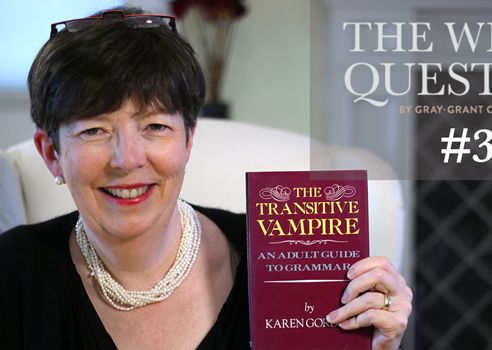Viewing time: 3 minutes and 49 seconds
The Write Question is a weekly video podcast about writing that I started in 2017 and that ran, more or less weekly, until April 2022. This is a republication of the third issue, which ran on Feb. 17/17.
Transcript
Welcome to The Write Question, the video-podcast designed to answer your questions about writing. I’m Daphne Gray-Grant.
Today I have a question from Gabriella Versi from Naples, Italy. Her question is: “I really want to get better at writing in English. How can I learn English grammar?”
I know how difficult it is to learn a second language. For about two years of my life I was fluent in spoken French; I’d even started to dream in the language. But after 30 years of absolutely no practice, I’ve lost it all. It’s hard work to learn another language and being able to write fluently in it is even more of a challenge.
If you want to get better at written English, I’m going to make the outrageous suggestion that you not focus on grammar too much. Grammar is all about rules and, instead, you want to feel comfort with your adopted language. So, to do that, I have five tips for you.
Number 1: read as much as you can. But don’t read grammar books! Focus on novels. Focus on books you love, so that reading becomes more appealing to to you than television or the Internet. You might even start with a book you already know and like, but read it in the English translation.
Number 2: Write in English as often as possible. Start off with small assignments — maybe a note to your partner or to a friend — but do it every day. When you have more comfort with this type of writing, you should think about starting a blog. What I like about blogs is that they’re public but not in an overwhelming way. You’ll likely have only a small number of readers, but you’ll develop a sense of obligation to them and that will help keep you writing.
Number 3: Find a friend who speaks English fluently, who can correct your written grammar. Maybe you can do something for them in return. If they’re interested in learning your language, you can proofread their Italian for them. If not, maybe you can cook for them or handle some childcare duties.
Number 4: Break the editing-while-you-write habit. I’ve found many people who speak English as a second language are so afraid of making mistakes that they rush to correct their sentences as they’re writing them. This is a terrible way to write and it’s going to slow you down and frustrate you. Instead, accept that you’re going to make a certain number of mistakes and fix them later! Remember that when you learned Italian as a young child, no one chastised you for incorrect pronunciation or grammar mistakes!
Number 5: Take advantage of some of the free or low-cost software out there that can correct your work. I’ll put some links in the description. There’s also one very short book I’d like to recommend. It’s called The Transitive Vampire: A Handbook of Grammar for the Innocent, the Eager and the Doomed by Karen Gordon. I bought it in London, some 30 years ago and I still enjoy looking at it because it’s funny and brief. I also enjoy the line drawings, especially the illustration for pronouns —“Her fiancé was a somnambulist.” If you want to spend money on one grammar book, this is the one I recommend.
I’ll also post a link in the description for a delightful story from the New Yorker magazine. It was written by American-Bengali writer Jhumpa Lahiri and, in it, she describes her desire to learn Italian.
I want to thank Gabriella for her question about how to learn English grammar. If anyone has a question you’d like me to answer here you can email, tweet, or call me on Skype.
Finally I’d like you to remember the words of American writer Geoffrey Willans who said, “You can never understand one language until you understand at least two.”
I’ll see you next week.
Links
Free or low-cost software for correcting mistakes:
New Yorker story by Jhumpa Lahiri.
The Transitive Vampire by Karen Gordon.


